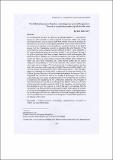PUC Institutional Repository
The Political Question Doctrine in the Supreme court of Bangladesh: Towards a constitution enforcing role for the court
JavaScript is disabled for your browser. Some features of this site may not work without it.
| dc.contributor.author | Roy, Jayanti Rani | |
| dc.date.accessioned | 2022-01-05T04:39:34Z | |
| dc.date.available | 2022-01-05T04:39:34Z | |
| dc.date.issued | 2016-07 | |
| dc.identifier.issn | 2075-650X | |
| dc.identifier.uri | http://digitalarchives.puc.ac.bd:8080/xmlui/handle/123456789/77 | |
| dc.description.abstract | In Constitutional discourse the doctrine of political question is a controversial theory. It is often narrated as a limit on judicial review power of the Court. Under this theory the court seeks to insulate itself from political pressures by avoiding the determination of questions which appear political in nature. It does not mean that the dispute has something to do with politics or anything like that. It is a kind of dispute that the Constitution provides to adjudicate by other branches of the government not by the judiciary. The paper, therefore, focuses a critical exposition of the doctrine of political questions and echoes that the Court should avoid the trap of the political questions which does not mean that there should not be anything like political questions. Because our Constitution aimed at a just social order based on certain core values e.g., justice (social, economic and political), human dignity, and rights and duty based democracy, and hence judicial review has its unique indigenous instrumentally. It's the Courts discretion- what would be decided and what ought not to be decided. The Court cannot take it (political question) as a law and at the same time on the touchstone of this doctrine, cannot decline itself to rule upon the dispute involving public interest which arises before it. Thus this paper begins by examining the history of the doctrine and the extent and nature of the Political Question Doctrine in Constitutional adjudication in the Supreme Court of Bangladesh and elsewhere the doctrine has developed. By this paper, the concept of justiciability, the proper scope of judicial review, the role a/judiciary, the separation of power and the Supremacy of the Constitution explaining core principles of constitutionalism and how the court will adjudicate different disputes on the basis of those principles would be explained a little. A few important case decisions have been analyzed to give the argument a context. The paper will conclude that the Constitution is a living document needing interpretation in the light of the demand of society and also explores that the political question doctrine is troubling because the doctrine forces the Court to confront the institutional strengths of the political branches and the Court's weaknesses in resolving some Constitutional questions on the demand of the society. | en_US |
| dc.language.iso | en_US | en_US |
| dc.publisher | Premier University, Chattogram | en_US |
| dc.relation.ispartofseries | Premier Critical Perspective;Vol. 2, Issue.1, July 2016, P. 259-282 | |
| dc.subject | Political Question, Justiciability, Judicial Review, Separation of Powers and Constitutionalism. | en_US |
| dc.title | The Political Question Doctrine in the Supreme court of Bangladesh: Towards a constitution enforcing role for the court | en_US |
| dc.type | Article | en_US |
